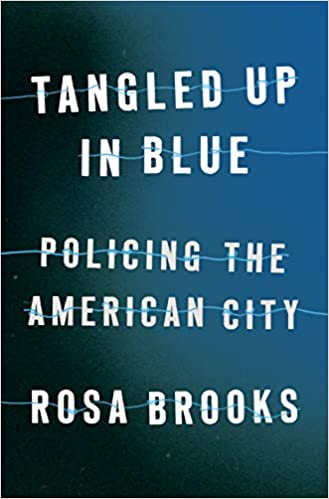You have /5 articles left.
Sign up for a free account or log in.
 Tangled Up in Blue: Policing the American City by Rosa Brooks
Tangled Up in Blue: Policing the American City by Rosa Brooks
Published in February 2021
Who would you include in your list of living academics and public intellectuals to invite to your first post-COVID dinner party?
After I read Tangled Up in Blue, Georgetown Law professor Rosa Brooks has made my list. If you know a little bit about Brooks, she might make your guest list as well.
First, Professor Brooks was also Officer Brooks. Tangled Up in Blue tells the story of the years she spent as a reserve police officer in Washington, D.C.
Second, Brooks is the daughter of Barbara Ehrenreich -- an author who would also likely make anyone's list of fascinating dinner party guests.
Academics are, by nature, curious people. Maybe even a bit nosy. We got into academia at least partly because we wanted to understand how and why things work the way they do.
While many of us in higher education are interested in policing, crime, gentrification, incarceration and violence, few of us would be curious enough to enter that world entirely. We would read books and articles, perhaps conduct surveys and interviews. We'd gather and analyze data. Brooks decided to become a cop.
In Washington, D.C., reserve officers are the real deal. They carry guns. They arrest people. Their uniforms are indistinguishable from those of career officers. Reserve officers may not get paid, but they can put you in cuffs.
Tangled Up in Blue is about why Brooks, a liberal law professor and daughter of a progressive icon, decided to join the police force. It is also a book about police training, urban policing and the underlying causes of police violence.
Brooks's motives for joining the D.C. Metropolitan Police were, somewhat surprisingly, not to write a book. Brooks's academic specialty is national security, not criminology. The fact that Brooks is not an academic expert in policing is both a strength and a weakness of Tangled Up in Blue.
On the strength side, one reason Tangled Up in Blue is so enjoyable to read is that it does not read like an academic book. Brooks makes the story of joining the police force and serving as a patrol officer highly personal. We learn lots about her upbringing and her struggles to move out of the shadow of her famous mom.
In writing about the daily life of a patrol officer, Brooks is insightful and informative about police culture and operations. Some of my favorite parts of Tangled Up in Blue are when Brooks compares police culture with academic culture and relates her struggles to straddle both worlds. Where academic culture runs from collegial to passive-aggressive, police culture prizes plain-spoken bluntness and aggression.
Throughout Brooks's description of the experience of learning to be a patrol officer, what comes across most strongly is her modest bravery. Brooks is determined to embrace every experience. She seems mostly undaunted by the challenges that trip most of us up.
If Brooks can maintain an active life as an academic, cop, spouse, parent, daughter, author, speaker and dog owner, perhaps there is hope for the rest of us.
I have some quarrel with Brooks when she veers away from the first-person narratives of doing police work (all fascinating and often heartbreaking) to her analysis of policing in general.
As Brooks fully admits, she is not an expert on policing -- and that blind spot sometimes shows. I would have liked more engagement with the research on the relationship between police activities and community outcomes.
In my reading of the literature, one of the failures of American policing is how many violent crimes remain unsolved in low-income communities. Brooks seems to think that the D.C. area is "overpoliced," and it may well be.
This argument would have been more persuasive if Brooks had examined counterarguments about the need to invest more resources in solving violent crime cases.
Brooks's choice to write an accessible and personal account of her experience as a police officer is hard to fault. Tangled Up in Blue may not persuade you that you want to follow Brooks's path and enlist as a part-time officer. (The job seems really hard.) But the book will help you understand what policing looks like from behind the badge.
What are you reading?




